Provocative, dynamic, imaginative, and vitally connected to the creative, cultural, and socio-political environment in Israel, A-Genre is one of my favorite performance events. This year’s festival, curated by Yair Vardi, with Nava Zuckerman as artistic advisor, focused on the relationship to the past, taking a critical look at nostalgia and that feeling that the “good old days” are gone, and inevitably, considering the future as well. An artistic observation and exploration of the changes that have taken place in Israeli culture. With this as the catalyst, the creative artists went in myriad directions, and last Friday, December 16, 2016 I set out in the deluge to try to see them all. Experimental theatre, experimental anything, is about asking questions. Whether or not an answer exists or may be found, one may (and must) still ask the questions with rigor – and that is what I appreciate about A-Genre. My impressions, in chronological order:
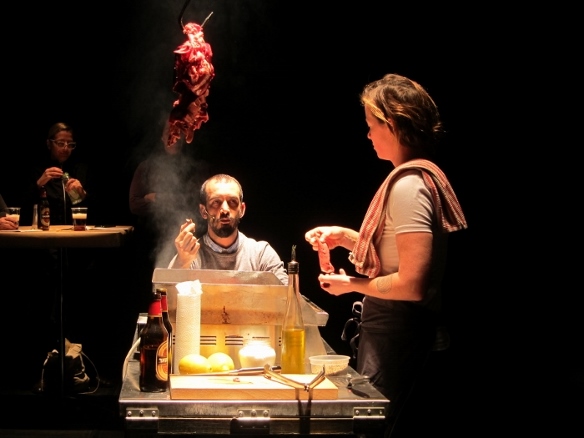
Raw, red, meat hangs from a butcher’s hook near a grill and table in the center of the stage in Talia Hoffman’s piece. She anoints the grill with olive oil, and serves the seared meat to Morad Hassan, actor and barman, who drinks beer and tells of his life, the village of his birth, his friends, while eating. There are several small tables covered in brown paper set up on the stage – this is where the audience is situated, in the middle of the action, with smoke and the scent of grilled meat rising in the air. The performance is inspired by a quote from Swiss writer Robert Walser (1878 – 1956), my rough translation from the brochure: “A good citizen must not arouse fear and suspicion; thinking too much is not his business, for whoever thinks too much becomes unpleasant, and it is utterly unnecessary to make oneself unpleasant. Better to snore and sleep than to think and philosophize.” Hassan tells of his life, repeating the story as he eats and drinks; the more he eats, the more his story is diminished and simplified. If in the first few repetitions he delivers his thoughts and ideas – a belief in “one state,” and “I believe in change that comes from within” – by the end of the performance this “good citizen” (who happens to be an Arab-Israeli citizen) is saying “opinions – far from it… I don’t think much.” Food for thought.
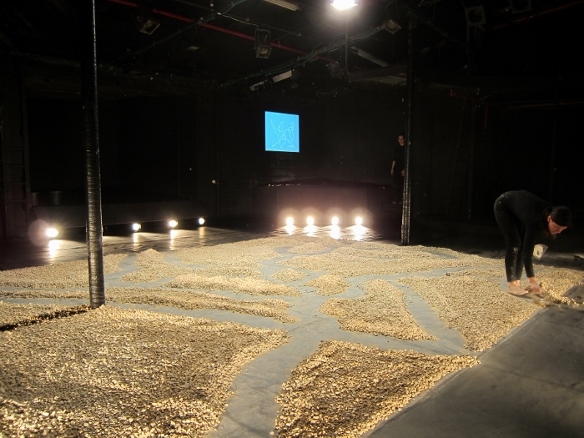
Merav Svirsky’s piece took place in the Cycle, where gravel filled a rectangle on the floor, and Michal Samama made paths by pushing away the small pieces and then sweeping the dust with a brush. In the far corner, Merav Svirsky chiseled paths on a board. Watching the two perform their tasks without a word, leaves the mind open for contemplation of paths, direction, crossroads and other associations. When lines converge it always makes me wonder what is marked – an event past or future, a place where things will happen? Reflecting on the difference between making and choosing a path, I watched the different paths. Ultimately, however, despite the intriguing physicality of the work, I felt frustrated that there were no signposts to indicate intentions.
Unfortunately, the day I was there, Rotem Tashach’s work could not be performed.
The next 45 minutes where a blur of activity, trying to see the gallery works on display. It is impossible to see them all, certainly not in their entirety. I like this choice on the part of curator Yair Vardi, it gives the event an element of suspense.
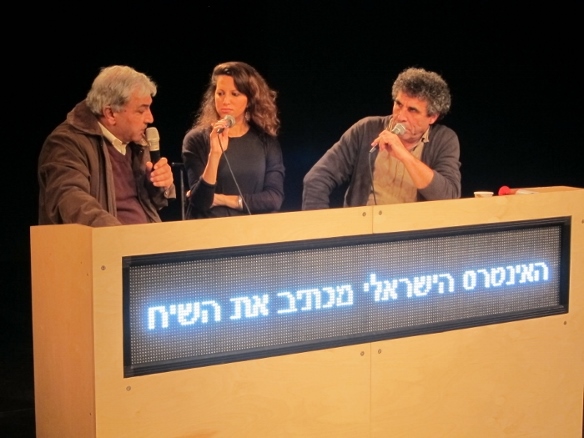
The Voice of the Next State is a public work of performance art by Omer Kreiger and Hillel Roman. Broadcasting live from Habima Square (and on Friday, from Tmuna Theatre, due to the rain), they hosted political and cultural figures who spoke of their visions for a future described as “the next state, the day after the occupation and a reality of shared life for Jews and Arabs.” I was there when representatives from Two States One Homeland, Meron Rapoport and Awni Almashni spoke, moderated and translated by Hanin Majadli. It was fascinating to hear them talk about a model for Arab-Jewish co-existence based on the EU model. All sessions (taking place over 3 days) were recorded and broadcast live and can be seen on the Voice of the Next State facebook page.
On the way to the Next State, I saw a video work by Ines Moldovsky, Cold Facts. While some of the dialogue was interesting – “how do you say anxiety in Arabic?”- and I enjoyed image of a woman and man embracing on a bed, each wrapped in the flag of his/her nation, ultimately, this piece did not come together for me and I moved on.
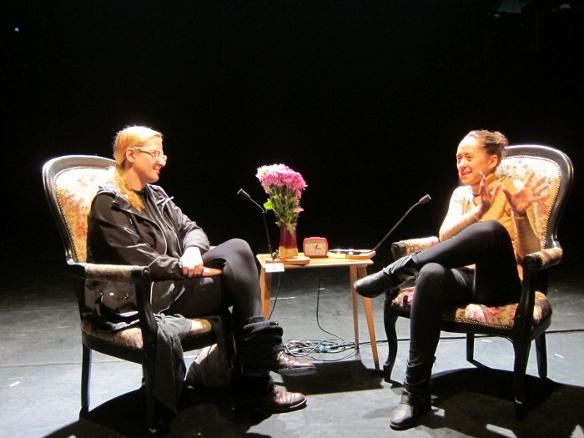
In the space that previously held meat as a metaphor, a different kind of grilling was taking place. Yulia Weinstein-Lavandiger raised this issue: in thinking about where do I come from, where am I going, there isn’t enough focus on the “I” as distinct from past successes and failures, future hopes and fears. In comfortable arm-chairs, she hosted a one-on-one conversation, without script or agenda, focusing on the here and now. Serendipitously, as I walked in, her partner was performance artist Natalie Zuckerman, and as they talked about fear of boring the audience, their verbal meanderings were very interesting, especially in this context. What does boredom mean to you? As a chronic daydreamer, I am rarely bored. When the vision before me fails to engage, I drift into other visions. In this case, the conversation had my rapt attention, as Natalie said, “I live in constant anxiety,” and talked about taking responsibility as a teacher and performer. Taking responsibility is something that is all too rarely part of our artistic, social, and political discourse, I was glad to have the issue come up here, in the present moment.
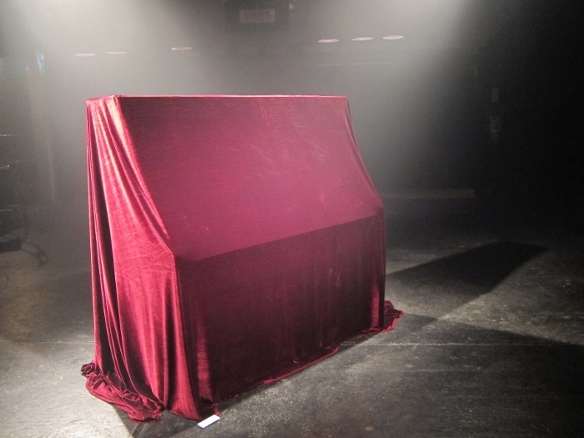
And in the midst of all this is a piano, dramatically covered in red velvet, in the center of the bar. Created by Assaf Shatil in cooperation with Musica Nova, I found this installation irresistible. Shatil composed music inspired by the popular song Next Year (BaShana Haba’a) by composer Nurit Hirsh, with lyrics by Ehud Manor. Many Israelis will identify with the experience of singing this song, year after year, a folk icon of new year’s celebration, that looks ahead to a rosy future that never arrives. If the song once represented hope, at best it now signifies the opposite. Brilliantly deconstructed, Shatil’s composition is activated by the movement of people in the bar: movement close to the piano triggers sound. Music happens, inadvertently, by people passing through. Music can be created by one’s actions. We can make things happen. We don’t have control over the outcome, but we can make things happen. And so much fun! Full and proper disclosure: I really like installations that let me play. Concept, sound, and visual elements work so well in this piece – I wish it was a permanent fixture in the bar! Or somewhere…

A most intriguing aspect of A-Genre this year was the re-working of some pieces from previous years. Alit Kreiz is a performance artist I have admired and respected since I first saw her perform in A-Genre at Tmuna nine years ago, with My Name is Luca, assisted at the time by her then 3-month-old son Luca, now nine, and not physically present in this version. Kreiz has a magnetic stage presence, acute sense of timing, wicked sense of humor, intelligence and sensitivity. Now as then, the focus is on the intersection of artist and mother – where do they meet, how do these different aspects of one’s identity impact one another, is it even possible to do both? Sitting in a red velvet floor length gown with a breast pump attached to her body and a microphone, she began by noting the way we tend to “divide our time into before and after,” reciting a litany of ‘befores and afters’: before the wall and after the wall, before Miri (Regev) and in spite of Miri, before 40 and after 45…

Referring to the original performance 9 years ago, she very comically discussed her attempts to persuade Luca to join her in this performance, concluding: “the moment in which I can do what I want without consulting him is over.” Musician Adam Scheflan was her random audience volunteer, standing in for Luca in a mother-son conversation. Kreiz juxtaposes visual and sometimes broad humor with deep feelings and insights. Talking about the original performance when Luca was 4 months old, she said, “I thought then that I knew everything there was to know about him.” That past performance ended with Kreiz’s phone number cheekily displayed on the back of the picnic blanket trailing after her as she walked offstage. By the way, she told the audience, it hasn’t changed.
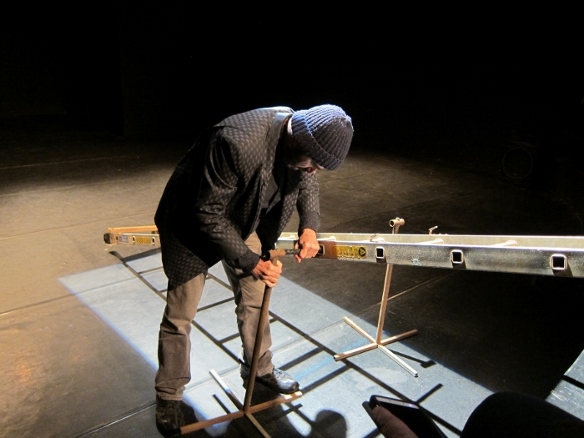
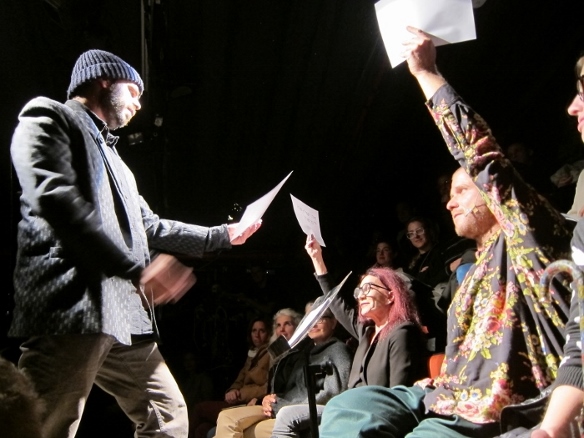
Nitzan Cohen, another artist whose work I admire, re-worked Private Collection from 2011. In this case, I had not seen the original, mea culpa, and to a certain extent felt an anxiety about missing references. Cohen’s breakneck pace powerful musing/rant, featuring Nava Zuckerman and Yair Vardi, was permeated with the elusive pervasive sense of home, construction, destruction, and the search for hope. The precarious nature of it all accentuated by Cohen perched on a wheelchair, amidst the audience, with his back to the downward ramp. It’s all downhill from here, and we don’t know where we’re going.

This time around in viewing the Gallery works, I sat down with Hannah Vazzana Greenwald to sort legumes, and could not walk away. First because, although knowing that I may not be able to complete the task, it was very hard for me to give myself permission to desist. Second, because the topic of discussion – Mizrahi Jews in Israel from the personal perspective of childhood and family memories, as well as other texts, including the pedagogic recommendations of poet Erez Bitton – is pertinent, and the conversation around the table – fascinating. Not all were in agreement at this informal performance-discussion. That’s part of the appeal: an encounter between people and opinions who might otherwise never converse, within a rather respectful, and tolerant atmosphere. Showing a flair for authentic Middle Eastern hospitality, Vazzana Greenwald nourished her audience with delicious, hot soup, much appreciated on a cold, rainy, afternoon.
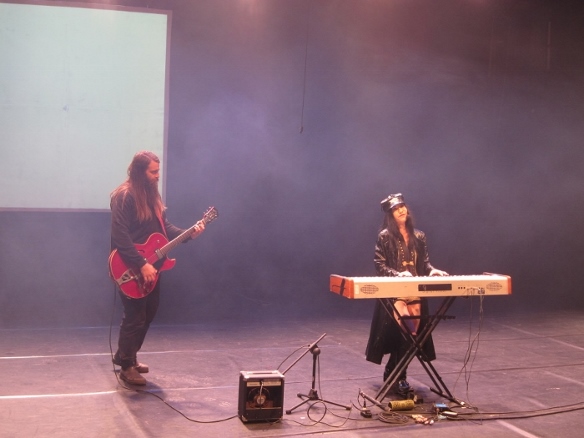
The final note of this eventful afternoon was that time-honored Israeli tradition, a sing-along. “Sing-along for Experienced Hikers,” conducted by Smadar Yaaron, originally premiered in 2011, and was inspired by Avigdor Lieberman’s Loyalty Oath bill. The texts for the songs are taken from actual bills proposed to the Israeli Knesset, with the catchy chorus: No citizenship without loyalty. The passage of time has only added to the treasury of shared experiences, bills proposed to the Knesset – such as the Muezzin bill banning the use of loudspeakers to amplify the call to prayer in mosques at certain hours and new criteria for funding cultural institutions – that can unite all the people of this land in tuneful harmony. Yaaron played keyboards, with Adam Scheflan on guitar. To illustrate the potential impact future laws may have on culture, Yaaron donned handcuffs and demonstrated that these do not present an obstacle to performing, saying: “You can get used to anything.”
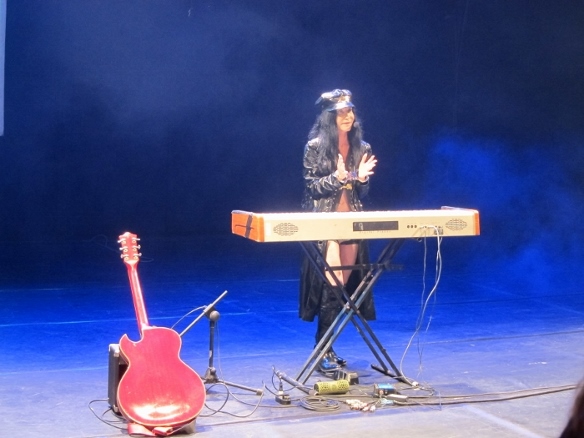
More photos on the Midnight East facebook page.





